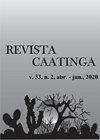谷子作物盐碱水和氮肥灌溉管理策略
IF 0.9
4区 农林科学
Q3 AGRONOMY
引用次数: 0
摘要
研究认为,施氮可以减轻珍珠粟植株的盐胁迫。因此,本研究旨在评价不同盐水灌溉和施氮方式下谷子作物的农艺性能。采用完全随机(CRD)试验设计,4 × 2因子方案,4个重复,第一个因子为4种灌溉策略:S1 =低盐度水(W1) = 0.3 dS m-1;S2 =播种后30天的盐水(W2) = 4.0 dS m-1 - DAS;S3 = W2 from 45 DAS;和S4 = W2从65 DAS;试验结束时,分别对光合作用、蒸腾作用、气孔导度、瞬时水分利用效率、内部CO2浓度、叶温、株高、茎粗、根长、穗长、叶干质量、茎干质量和根干质量进行评价。在S1、S2和S3策略下,60和120 kg ha-1的施肥量提高了谷子植株的光合作用、蒸腾作用、气孔导度和内部CO2浓度。S1和S4策略在提高水分有效利用和降低叶温方面效果更好。本文章由计算机程序翻译,如有差异,请以英文原文为准。
Strategies for the management of irrigation with saline water and nitrogen fertilization in millet crop
ABSTRACT It is believed that nitrogen fertilization will attenuate the salt stress on pearl millet plants. Thus, the objective was to evaluate the agronomic performance of the millet crop under different saline water irrigation strategies and nitrogen fertilization. The experimental design adopted was completely randomized (CRD), in a 4 x 2 factorial scheme, with 4 replicates, with the first factor being four irrigation strategies: S1 = low-salinity water (W1) = 0.3 dS m-1 throughout the cycle; S2 = saline water (W2) = 4.0 dS m-1 from 30 days after sowing - DAS; S3 = W2 from 45 DAS; and S4 = W2 from 65 DAS; and the second factor being two nitrogen doses (60 and 120 kg ha-1 of N). At the end of the experiment, the following variables were evaluated: photosynthesis, transpiration, stomatal conductance, instantaneous water use efficiency, internal CO2 concentration, leaf temperature, plant height, stem diameter, root length, panicle length, leaf dry mass, stem dry mass and root dry mass. Fertilization with 60 and 120 kg ha-1 promotes greater photosynthesis, transpiration, stomatal conductance and internal CO2 concentration in millet plants under the strategies S1, S2 and S3. The strategies S1 and S4 were more efficient to increase the efficient use of water and reduce leaf temperature.
求助全文
通过发布文献求助,成功后即可免费获取论文全文。
去求助
来源期刊

Revista Caatinga
AGRONOMY-
CiteScore
2.10
自引率
11.10%
发文量
67
审稿时长
6-12 weeks
期刊介绍:
A Revista Caatinga é uma publicação científica que apresenta periodicidade trimestral, publicada pela Pró-Reitoria de Pesquisa e Pós-Graduação da Universidade Federal Rural do Semi-Árido – UFERSA, desde 1976.
Objetiva proporcionar à comunidade científica, publicações de alto nível nas áreas de Ciências Agrárias e Recursos Naturais, disponibilizando, integral e gratuitamente, resultados relevantes das pesquisas publicadas.
 求助内容:
求助内容: 应助结果提醒方式:
应助结果提醒方式:


